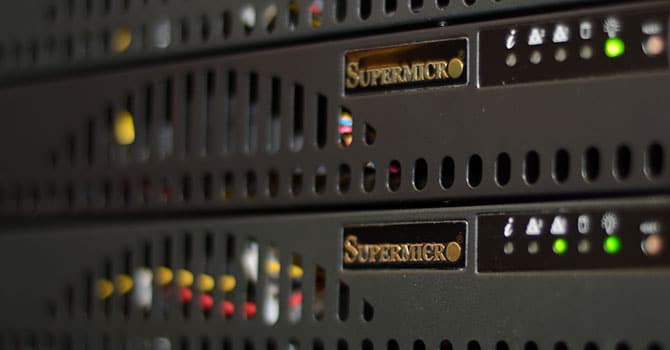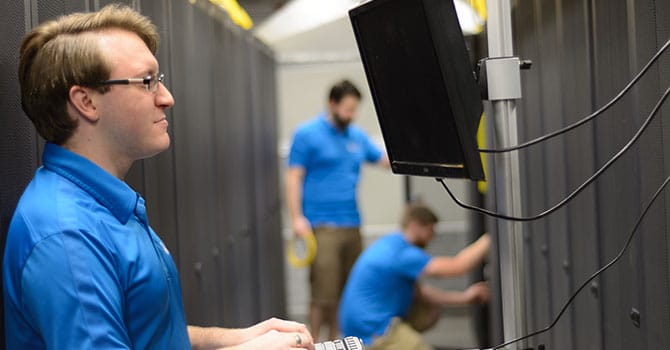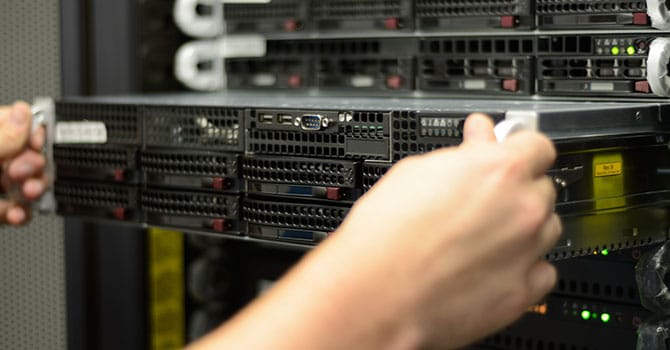How Dedicated Server Hosting Works

As you research various hosting options, you will come across a variety of hosting types such as VPS, As you research various hosting options, you will come across various hosting types, such as VPS, Hybrid Servers, Cloud, and Dedicated Servers. The name may seem obvious, but what exactly are dedicated servers, and what applications are best for this hosting type? In this article, we will explain what a dedicated server is, how it works, dedicated server hardware, factors to consider when choosing a dedicated server, and dedicated server use cases.
What is a Dedicated Server?
A dedicated server is “an enterprise-grade physical server used to host the applications and services of a single hosting client.” In simple terms, a dedicated server is a physical server that is completely dedicated to a single client, meaning that all the computing resources of the server are allocated to that client.
They provide greater control and flexibility over the hosting environment, as well as enhanced security and performance. Dedicated servers are usually more expensive than shared hosting, but they offer a more powerful and reliable hosting environment.
Dedicated servers are typically used to host high-traffic websites, web applications, and other hosting scenarios where performance is paramount. To answer the question explicitly on “What is a dedicated server?”, it’s useful to start with a comparison to other types of hosting. The most common infrastructure hosting options are shared hosting, virtual private servers hosting, cloud hosting, and dedicated server hosting.
The main differentiating feature is that a dedicated server is a single-tenant hosting environment. Most infrastructure hosting options divide a server between two or more users: cloud hosting platforms, for example, divide the resources of one physical server between several virtual machines. Known as multi-tenant hosting environments, none provide a dedicated server’s full resources and performance.
With a dedicated hosting server, everything the server offers is at your disposal. Dedicated servers are the most powerful infrastructure hosting option — no other hosting option can give you more power and flexibility.
How Does Dedicated (Gaming) Server Hosting Work?
Dedicated Server Hosting is a type of web hosting service that allows businesses and organizations to have full control over a single physical server. This type of hosting is ideal for businesses with complex websites that require a high level of website security and have high-traffic requirements.
With dedicated server hosting, the server is physically located in the hosting provider’s data center, and the customer is provided full administrative access. By creating your own dedicated gaming server, you can set up a persistent online gaming environment for yourself. A dedicated server allows the customer to customize the server to their needs and install the software that is necessary for the website to operate.
Customers can choose the operating system and hardware that best fits their needs and can control the server’s resources, such as bandwidth, storage, RAM, and processing power. This allows the customer to optimize their website’s performance and ensures that their website can handle high traffic levels.
The customer also has complete control over the server’s security. They can configure firewalls, set up user accounts, and control who has access to the server. This ensures that only authorized individuals have access to the server and that the website is protected from malicious attacks.
With dedicated server hosting, the customer can also benefit from 24/7 support. The hosting provider’s technical staff can assist with any issues with the server.
Bare Metal Server or Dedicated Server

Before we move on, I’d like to clear up a naming confusion. As you research what dedicated servers are, you’ll come across the phrase “bare metal server”. A bare metal server is the same thing as a dedicated server. The difference has more to do with branding than the product itself.
Bare metal conveys that the user is close to the metal, the physical hardware, as opposed to a cloud server, which includes a hypervisor layer that puts the user at a remove from the bare metal. A dedicated server means the same thing as a bare metal, so you can consider the two things identical.
Dedicated Server Hardware
A dedicated server is a computer like the desktop machines you use at home or work. Each server contains processors, memory, storage, network hardware, and buses to connect the components.
But dedicated servers don’t look like ordinary computers and don’t contain the same components. Unlike the consumer-grade components of the average PC or Mac, dedicated servers contain enterprise-grade hardware that is more reliable, less prone to failure, and much more powerful.
Let’s look at a couple of examples: RAM and the CPU.
Dedicated Server RAM
Enterprise-grade servers typically use ECC (Error Correcting Code) RAM, which is more reliable and expensive than the RAM in the average laptop or PC. ECC RAM includes special hardware that prevents many of the most common causes of data corruption. Corruption occurs for all sorts of reasons, from electrical interference to cosmic rays, and ECC RAM can detect and make corrections when errors occur.
Error correction makes dedicated servers more reliable, and where business-critical applications are concerned, reliability matters. Dedicated servers run 24 hours a day for years without a hiccup, and they can do that because they’re built with high-quality components.
Dedicated servers can also accommodate more memory than an average machine: it’s not unusual for a dedicated server to be equipped with up to 512GB of memory.
Processors
Dedicated server processors are, as you might expect, the most powerful processors on the market. Chip manufacturers create processors targeting servers, such as Intel’s Xeon range, engineered for optimal speed, reliability, and scalability.
In this context, scalability is directly related to the number of processor cores installed on a server. The most powerful dedicated servers have upward of 40 processor cores, making them capable of crunching huge amounts of data.
Rack Mounted Servers
Dedicated servers differ from non-server machines in another conspicuous way: they don’t look the same. Dedicated servers are designed to be mounted in data center racks, taking up as little space as possible while providing optimal cooling for equipment that can generate a lot of heat.
The other components in a dedicated server are of equivalent quality, from the most reliable storage to the fastest buses, all engineered to move data around the machine as quickly and reliably as possible.
Because dedicated servers are intended to be the premiere hosting option, dedicated server hosting plans are also given generous bandwidth allowances compared to other hosting options.
In a nutshell, if performance and reliability are your most important concerns, you won’t find a better hosting solution than dedicated servers.
Dedicated Server Use Cases

Now we’re clear on what a dedicated server is; it’s time to look at how they’re used. Dedicated servers are chosen for two main reasons: power and privacy. Dedicated servers provide better performance than other hosting options, and all of that power is at the disposal of a single user.
High-Traffic Websites
High-traffic websites and eCommerce stores are hosted on one or more dedicated servers. Hosting a website that receives thousands of concurrent requests is resource intensive. Many site owners opt to “scale up” to a more powerful server instead of “scaling out” across many less powerful servers. Choosing a more powerful dedicated server is less complex than building a cluster of smaller machines.
Multiple Websites
Web hosting companies and service providers that offer web hosting base their products on dedicated servers. Many smaller web hosting companies build their products on dedicated servers leased from companies like ServerMania.
A high-end dedicated server can support hundreds or thousands of moderately trafficked WordPress sites.
Private Cloud Hosting
Public cloud platforms are built on dedicated servers, and many organizations choose to rent a dedicated server on which to run their own private clouds, virtual machines, and in some cases, to build public cloud hosting services of their own — ServerMania’s high availability public cloud runs on the same powerful dedicated servers we lease to our customers.
Database Servers
Public cloud platforms are built on dedicated servers. Many organizations rent a dedicated server to run their private clouds, virtual machines, and in some cases, to build public cloud hosting services of their own — ServerMania’s high availability public cloud runs on the same powerful dedicated servers we lease to our customers.
Database Servers
Databases often support business-critical operations; they must be reliable and capable of quickly reading and writing data.
Factors to Consider when Choosing the Best Dedicated (Gaming) Server Provider

When choosing the best-dedicated (gaming) server, there are many factors to consider. These include:
- Price: The cost of a dedicated server can vary significantly depending on the hardware and features you need. However, ServerMania allows you to buy your dedicated server with BTC. Ensure you research and compare prices between different providers to find the best value for your budget.
- Storage Capacity: Consider your current and future storage needs when choosing a server. You may need to invest in a larger server if you require more resources.
- Bandwidth: Bandwidth is important for any website, especially with high traffic. Consider the bandwidth you need to meet your website’s requirements.
- Reliability: Choose a reliable hosting provider with a good uptime guarantee.
- Security: Dedicated servers offer enhanced security features, so check what security features are included in the package.
- Support: Many hosting providers offer different levels of support. Check what support is available and decide whether you need basic or advanced support.
- Scalability: Consider your website’s growth and whether the dedicated server you choose can scale with it.
Renting vs. Buying A Dedicated Server
A dedicated server looks like a thin metal device that can be easily accessed and stored inside a rack of servers.
Once a dedicated server has been chosen, the next decision is whether to buy or rent. Some organizations choose to buy a server and house it with a colocation provider.
Colocation has advantages, but the burden of managing a colocated server rests on the client. The client has to deal with any issues with their server, usually in person.
With a dedicated server rental or lease, the hosting provider handles much of the management and maintenance. You’ll never be expected to do repairs or pay for replacement hardware.
Additionally, when you lease a server on a month-to-month basis, you can change hosting providers anytime. That’s not the case if you invest in server hardware.
If you’d like more information about finding the ideal dedicated server for your business, our experts will be happy to provide a free consultation and quote.
Was this page helpful?

